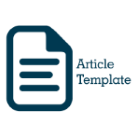A CASE STUDY OF TEACHER-STUDENT COLLABORATIVE ASSESSMENT (TSCA) IN ACADEMIC ENGLISH WRITING CLASSROOMS
Abstract
Full Text:
PDFReferences
Barber, C. L. (1962). Some measurable characteristics of modern scientific prose. Contributions to English syntax and philology, 21-43.
Charles, M., & Pecorari, D. (2015). Introducing English for academic purposes. Routledge. Gao, Y., Zhang, F., Zhang, S., & Schunn, C. D. (2018). Effects of receiving peer feedback in english writing: a study based on Peerceptiv. Technology Enhanced Foreign Language Education, 180(2), 3-9.
Han, J. (2001). English Writing Teaching: Process Style approach. Foreign Language Field (4), 6.
Lee, I., Mak, P., & Burns, A. (2016). EFL teachers’ attempts at feedback innovation in the writing classroom. Language teaching research, 20(2), 248-269.
Nesi, H., & Gardner, S. (2012). Genres across the disciplines: Student writing in higher education. Cambridge University Press.
Novakovich, J. (2016). Fostering critical thinking and reflection through blog?mediated peer
feedback. Journal of Computer Assisted Learning, 32(1), 16-30.
Ruegg, R. (2015). The relative effects of peer and teacher feedback on improvement in EFL students’ writing ability. Linguistics and Education, 29, 73-82.
Sun, S. (2020). Optimizing teacher-student collaborative assessment in the production-oriented approach: A dialectical research. Chinese Journal of Applied Linguistics, 43(3), 305-322.
Sun, H., & Wang, M. (2022). Effects of teacher intervention and type of peer feedback on student writing revision. Language Teaching Research, 13621688221080507.
Tian, L., & Li, L. (2018). Chinese EFL learners’ perception of peer oral and written feedback as providers, receivers and observers. Language Awareness, 27(4), 312-330.
Vygotsky, L. S. (1987). Thinking and speech. In RW Rieber & AS Carton (eds.)., The collected works of LS Vygotsky. Problems of general psychology (pp, 1, 1987.
Wang, W. (2014). Students’ perceptions of rubric-referenced peer feedback on EFL writing: A longitudinal inquiry. Assessing Writing, 19, 80-96.
Wen, Q. (2018). The production-oriented approach to teaching university students English in China. Language Teaching, 51(4), 526-540.
Yan, M. (2014). Construction of Academic English Writing ability evaluation system in colleges and universities. Journal of Foreign Languages (6), 5.
Yu, S., & Lee, I. (2014). An analysis of Chinese EFL students’ use of first and second language in peer feedback of L2 writing. System, 47, 28-38.
Yu, S., & Liu, C. (2021). Improving student feedback literacy in academic writing: An evidence-based framework. Assessing Writing, 48, 100525.
Zeng, X. (2020). Design and Application of Teacher-student Collaborative Assessment in College English Writing Class. Journal of Southwest University of Science and Technology, 37(2), 19-25.
Zheng, Y., & Yu, S. (2018). Student engagement with teacher written corrective feedback in EFL writing: A case study of Chinese lower-proficiency students. Assessing Writing, 37, 13-24.
Xiong, S., & Zou, W. (2012). What is English for Academic Purposes? How to teach? -- A classroom experimental study of "Academic English" for English major undergraduates. Chinese Foreign Languages (2), 11.
Refbacks
- There are currently no refbacks.
This is an Open Access article distributed under the terms of the Creative Commons Attribution-NonCommercial-NoDerivatives 4.0 International (CC BY-NC-ND 4.0), permitting copy and redistribute the material in any medium or format.





